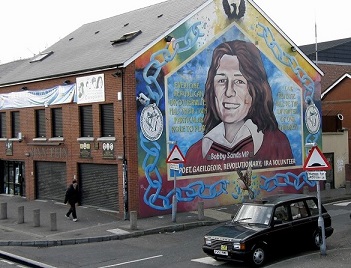Bobby Sands and Margaret Thatcher
Jim Gibney
[Article originally published on May 15, 2009]
Two personalities from opposite ends of the political spectrum, who helped shape their respective worlds and are inextricably linked through decisions they took over 30 years ago had anniversaries last week.
Tuesday past marked the 28th anniversary of the death on hunger strike of Bobby Sands MP. Bobby died on the 66th day of his hunger strike. During it he was elected by 30,497 people in Fermanagh and South Tyrone to the British parliament, though that parliament meant little to them.
Monday past marked the 30th anniversary of the election of Margaret Thatcher as British prime minister.
The decision by Bobby Sands and others to go on hunger strike was provoked by the decision, of first a British Labour government, then upheld by Thatcher’s government, to try to criminalise the republican struggle by withdrawing political status from political prisoners.
The legacy of the hunger strikers and that of Thatcher could not be of greater historical contrast.
As Thatcher took office on the steps of 10 Downing Street she quoted St Francis of Assisi: “Where there is discord may we bring harmony. Where there is error may we bring truth. Where there is doubt may we bring faith. And where there is despair may we bring hope.” Within a short period of time the consequences for the people of Ireland and Britain of Thatcher’s rule was, ‘discord’, ‘error’, ‘doubt’ and ‘despair’.
To this day across nationalist Ireland no other British political figure, with the exception of Oliver Cromwell, provokes such feelings of anger and hostility as Margaret Thatcher.
The same feelings exist among many British people, especially those working-class communities who depended on the coal mines, the shipping industry which Thatcher destroyed and the Trades Union Movement which she also targeted.
As she left Downing Street in November 1990, with tear-filled eyes, I danced with delight around the room of my Twinbrook flat.
Her party had rejected her and forced her from office. The downfallen figure, practically speechless, she could only muster the comment, “It’s a funny old world” as she was driven out of Downing Street and off the world stage.
Left behind her in Britain was a deeply divided and embittered society. Britain’s first woman prime minister did little in the way of promoting women or feminism. Fearful of rivals she did not appoint a single woman to any of her cabinets.
Thatcher detested the trade unions and brought in legislation restricting the right to strike.
She used the full power of the state to crush the miners strike led by Arthur Scargill and then systematically presided over the closure of the mines, indifferent to the communities who depended on them.
She befriended Chile’s dictator, Pinochet, while refusing to back sanctions against the white racist regime in South Africa. She defended the sinking of the Belgrano during the Malvinas war with the loss of hundreds of young sailors’ lives.
Her Irish legacy includes the hunger strike, shoot-to-kill, supergrass trials and censorship.
She is so reviled the party that she led, the Conservatives, rarely mention her name.
On the other hand Bobby Sands and the other hunger strikers are venerated and remembered to this day not only by republicans but by those who believe in liberty and freedom across the world.
Twenty-eight years later the hunger strike of 1981 remains a talking point as an example of unimaginable heroism and bravery. Many books, plays and films have recorded the prisoners’ sacrifice.
Bobby Sands is an international icon, akin to Che Guevara.
The Bobby Sands website is used daily by people across the globe seeking information about the 1981 hunger strike. Bobby’s self-sacrifice and dedication to those on whose behalf he died is inspirational. He lifts the spirit of people who are oppressed because they easily identify with him.
Bobby’s election as MP for Fermanagh and South Tyrone and the elections of hunger striker Kieran Doherty and Paddy Agnew as TDs and Owen Carron after Bobby fundamentally changed the course of the republican struggle and Irish history.
Modern Sinn Féin was hewed out of 1981. Thatcher tried to bury the republican struggle in the tombs of the H-Blocks but it endured - as does the memory of Bobby Sands and the other hunger strikers.
___________________________________________________________________________________
Article published here: Irish Republican News. Photo: The Troubles (Knut Inge Skifjeld)
URL: http://www.a-w-i-p.com/index.php/2013/04/16/bobby-sands-and-margaret-thatcher

























